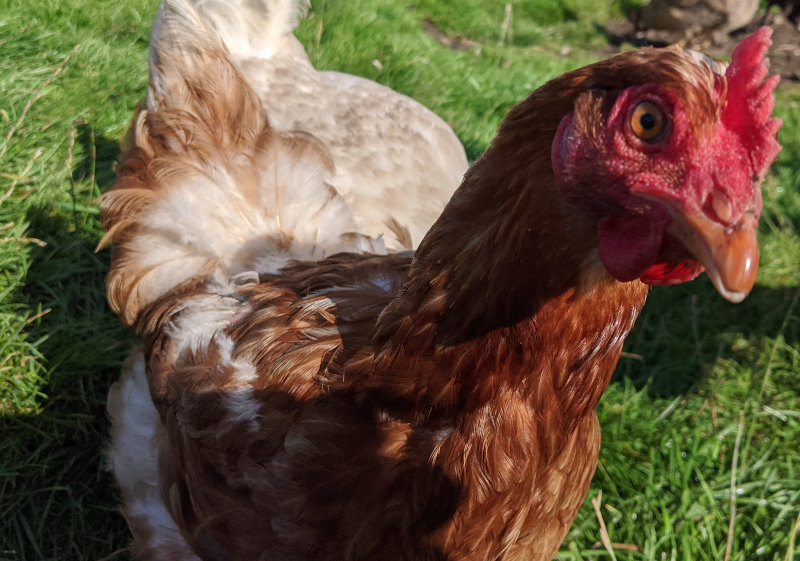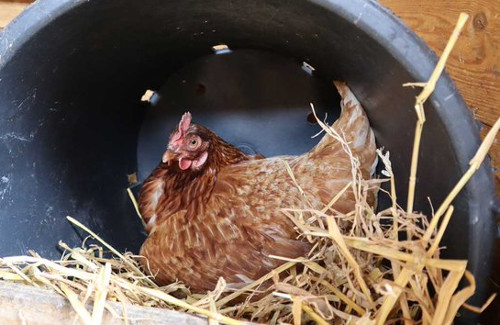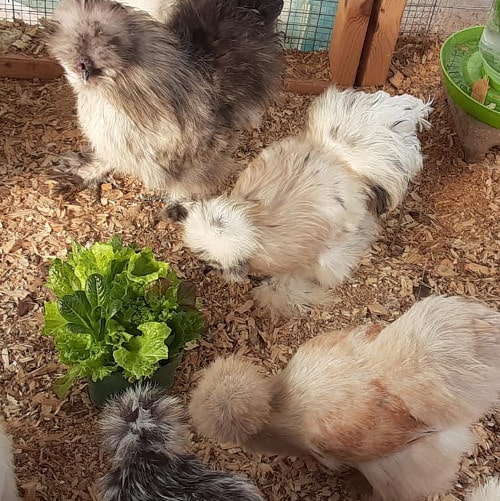When do chickens start laying eggs

Most backyard chickens start laying eggs when they are about 5 to 7 months old. This age can vary depending on the breed, diet, and environmental factors.
A hen needs certain light, nutritional, and environmental conditions to lay eggs properly, as well as time. Here are some answered questions about when chickens start to lay eggs.
Factors Influencing the Start of Egg-Laying:
Breed Variations:
- Early Layers: Breeds like Leghorns and Australorps often begin laying around 4 to 5 months.
- Late Layers: Larger breeds like Orpingtons and Wyandottes may start laying closer to 7 to 8 months.
Daylight Hours:
- Chickens require about 14 to 16 hours of daylight to stimulate egg production.
- Supplementing light in the coop during shorter winter days can help maintain egg production.
Nutrition:
- A balanced diet rich in calcium and protein is crucial for early and consistent egg laying.
- Starter feed should be switched to layer feed around 18 weeks of age to provide necessary nutrients for egg production.
Environment and Stress:
- A comfortable, stress-free environment encourages earlier laying.
- Factors like predator threats, poor coop conditions, and overcrowding can delay the start of egg-laying.
Health and Genetics:
- Healthy chickens free from disease and parasites will generally start laying sooner.
- Genetics play a significant role; select breeds known for good laying abilities.
How do you know when chickens are ready to lay eggs?
There are some signs that show when your hen is ready to lay eggs. Its wattle and comb will look different, they will turn a darker red and swell.
The hen will have a coat of shiny plumage, and will be full-sized. It also may begin to sing or make more noises vocally.
Below: Modern egg laying hybrids like this one can come into lay as young as 16 to 18 weeks old.

The pelvic bones, located near the vent just under the breast, will become flexible and spread. This is to make room for eggs to pass through the hen's body. If you can, place your hands around this area and feel for three bones.
The signs a chickens are ready to start laying eggs are:
- Cockerels become interested as the hens become fertile.
- Combs and wattles become redder and more pronounced as hens approach laying age.
- Frequent visits to the nest without settling along with other signs of nesting behaviour.
- Hens sometimes adopt a squatting posture.
- Pelvic gap widens.
If they are close together, your hen is not ready to lay eggs. If they are spread apart, your hen should be ready to lay eggs.
Below: Silkies are well known for taking a long time to come into lay.
That said, you should not rush your hen to lay eggs, just let them relax and do it naturally.
At what age do chickens begin to lay?
Young hens, or pullets, start to lay eggs at around 18 to 24 weeks of age. This can depend on the breed of chicken, with some breeds taking as much as one year to begin laying.
Larger breeds of chicken will take about six months to start laying eggs. On average, though, most breeds will take around five months.
This can also depend on nutritional and environmental factors. If a pullet is well-nourished, it will likely produce eggs within this period. Usually, this means giving your chicks a starter feed for the first 6 weeks of life, with a 20 - 22% protein content.
From 6 to 20 weeks, you should feed your pullets a feed with a 14 - 16% protein content. Finally, a hen laying eggs should have a feed that is 15 - 18% protein.
Below: Nesting is essential for laying eggs.

If the pullet has a place to nest, it is more likely to produce eggs as well. A cardboard or wooden box lined with straw is a good place to start. The objective is to reduce the stress in the pullet and get it to relax.
How long does it take for a chicken to lay its egg?
It usually takes about 24 to 26 hours for a hen to lay its first egg. Depending on the type, a hen can start the egg production process from 15 to 30 minutes after the lay, up to a day afterwards. It then takes another 24 to 26 hours for the hen to lay its next egg.
The longer periods of time between egg production (one day) are caused by the staggered period of time between egg production (26 hours) and days (24 hours). Because of that, a hen will lay later in each day.
Below: A hybrid hen settling on a nest.

Since hens are sensitive to daylight, there will be a period (of about a day) when the hen will stop laying. Then, it will lay again reflexively to regular daylight hours.
How do I get my chickens to start laying eggs?
If you want to get your hens or pullets to start laying eggs, you will want to reduce their stress and make them feel more relaxed. In order to do this, you have to prepare nesting boxes for them. Do this as your hen reaches egg-laying maturity, maybe around 16-18 weeks.
Below: Food and water are important for egg production.

A wooden box lined with straw or hay should make them feel relaxed. Nests are not limited to these places, however, and your hen may use a place under bushes, in a bin, or anywhere there is adequate space and shelter.
To make sure your birds begin to lay:
- Good balanced feed.
- Clean water.
- Stress free flock.
- Long days.
- Have nest boxes ready with pottery eggs.
- Disease free chickens lay much better.
- Parasites can interrupt the laying cycle.
If your hen is still not laying eggs, you may want to put fake eggs inside their nest. As unbelievable as it may seem, a fake ceramic egg or golf ball will help a hen feel more relaxed and ready to lay. If your hen has been eating already-laid eggs (this is known to happen) they tend to stop once they try pecking into otherwise fake eggs.
Can you eat first laid eggs?
You can eat first laid eggs, but be aware that these eggs probably won't be like the ones you see in the store. A hen will start laying eggs that are small, misshapen, have no shells or yolks, or possess other irregularities.
Yolk-less eggs are the same shape and size as marbles or grapes. They have soft shells and, of course, no yolks. They are edible, and after about two weeks, the hen will start to lay more regularly-sized eggs with yolks.
Soft-shelled eggs are often common in early egg-laying cycles. These eggs have a soft and/or thin shell. You can still eat these, too, but make sure you remove them from the nest early on to prevent them breaking and dirtying the nest.
It is important to keep the hen relaxed and unstressed during this process. Disturbing a hen can cause rough or misshapen eggs, still edible, but not exactly ideal. Do not disturb the hens!
When do chickens start laying after winter?
Mine start again in early February as the days start to get longer. Further North it may be a few weeks later and more toward the equator it may be sooner.
Some hens do not stop laying their eggs. That is, they will lay their eggs year-round. This is usually the case in places where the weather is warm year-round.
in colder climates, winters with shorter days can affect your hens. Hens are sensitive to daylight, so some stop laying eggs completely once winter comes around. If there are less than 12 hours of daylight, hens will usually stop.
Once there are more than twelve hours of daylight, the hens will start laying again. This can happen around the spring equinox, but it depends. Some sources have said as early as the beginning of February, other sources have said more likely in mid to late March. Differences in environments and breeds can also affect these outcomes, so take these into consideration.
